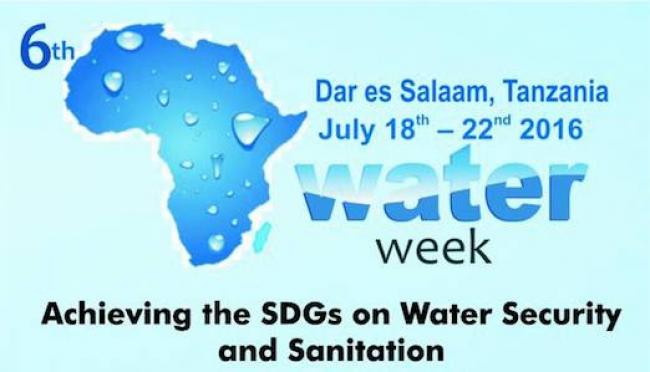Published on: 28/06/2016

Africa needs a roadmap to achieve the Sustainable Development Goals (SDGs) for water security and sanitation by 2030. Such a roadmap was the desired outcome of the 6th Africa Water Week (AWW-6), a biennial event that attracted 1,000 participants from governments, regional institutions, international partners, the private sector, the scientific community, civil society, and the media.
The convenors of the Africa Water Week were the African Ministers Council on Water (AMCOW) in conjunction with the African Union Commission and the government of host country Tanzania. AMCOW held hold its 10th General Assembly during the final two days of AWW-6.
The four sub themes of AWW-6 were:
The Watershed empowering citizens stand at Africa Water Week, hosted by IRC, Akvo, Simavi, and Wetlands International offered participants an opportunity to learn about this new policy and advocacy capacity building programme underway with the Dutch Ministry of Foreign Affairs.
In addition, IRC (co)convened two technical sessions:
Tuesday 19 July 2016, 09:00 - 10:30 hrs - Sub Theme 1: 2nd Technical Session:
Strengthening national capacities for WASH sector learning
Convener: IRC, Erma Uytewaal (for the Africa Joint WASH Learning Initiative)
Co-Conveners: Africa Joint WASH Learning Initiative Members (WSSCC, RWSN, pS-Eau, UNICEF-WCARO, SWA, AMCOW)
This interactive session looked at the importance of Knowledge Management and Sector Learning as essential components in strengthening national sector systems. The session highlighted two initiatives that have put Knowledge Management and Sector Learning high on the agenda:
The full session description and programme can be downloaded by following this link.
Wednesday 20 July 2016, 16:00 - 17:30 hrs - Sub Theme 4: 9th Technical Session:
Country-led monitoring for improved service delivery
Lead Convener: AMCOW and UNICEF
Co-Conveners: IRC, Nicolas Dickinson, and others
In this session participants learned how country-led monitoring has improved WASH services and water quality, water resource management or faecal sludge management, where it has developed and how it can be strengthened. National monitoring and evaluation systems are not only important at country-level but also for tracking regional and international targets as defined in the Ngor Declaration, SDG6 and Sanitation and Water for All (SWA) commitments. How can systems be aligned to meet these all these different requirements? Read more.
IRC shared a framework for assessing national monitoring systems, adapted from the health sector (UNAIDS).
Related to the above session, IRC's Alana Potter was invited to join the panel at the concurrent 9th technical session of Sub Theme 1 on "The AfricaSan Commitments on Sanitation and Hygiene and the SDGs". Read more
IIRC has an MoU with AMCOW, under which we recently provided support to develop regional core indicators to monitor the N'gor Commitments on Sanitation and Hygiene.